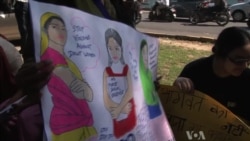NEW DELHI —
In terms of freedom, Swati Varma is not asking for much more than the ability to be herself.
“Just to be able to walk on the street, wearing what I want to wear and not be stared at, that’s a privilege," says Swati Varma, who is a psychologist. "Most of the time when we go out here, we have to be very conscious of what we are wearing, because all the eyes, both men and women, are on us. So personally I am here, because I just want to be.”
Since the December 16 gang rape and subsequent death of a young woman in New Delhi, protesters have been gathering regularly in the capital to make sure their voices are heard.
New Delhi is infamously known as the rape capital of India, with 706 incidents recorded in 2012 by the National Crime Records Bureau, the highest in a decade.
Despite recent demonstrations and the implementation of an anti-rape ordinance, university student Manjusha Madhu hasn't seen much of a difference when it comes to women’s safety.
“More and more cases of rape and sexual assault that are happening all over the country and it does not seem to have stopped, changed," Madhu says. "Nothing has seemed to have changed. So I think it’s important that all of us come back on the streets, raise our voices, and make sure that we are heard.”
Women’s rights activists like Kavita Krishnan of the All India Progressive Women's Association, who were pinning their hopes on lawmakers, have been disappointed so far. Krishnan believes proposed legislation in parliament falls short on the issues of police accountability and marital rape.
“They are continuing to say that we can’t admit that marital rape happens, we can’t allow women to complain against their husband of marital rape," she says. "These are all things which cannot have a place in modern India. We have to oppose it. We are going to demand and win these changes in the law.”
“Just to be able to walk on the street, wearing what I want to wear and not be stared at, that’s a privilege," says Swati Varma, who is a psychologist. "Most of the time when we go out here, we have to be very conscious of what we are wearing, because all the eyes, both men and women, are on us. So personally I am here, because I just want to be.”
Since the December 16 gang rape and subsequent death of a young woman in New Delhi, protesters have been gathering regularly in the capital to make sure their voices are heard.
New Delhi is infamously known as the rape capital of India, with 706 incidents recorded in 2012 by the National Crime Records Bureau, the highest in a decade.
Despite recent demonstrations and the implementation of an anti-rape ordinance, university student Manjusha Madhu hasn't seen much of a difference when it comes to women’s safety.
“More and more cases of rape and sexual assault that are happening all over the country and it does not seem to have stopped, changed," Madhu says. "Nothing has seemed to have changed. So I think it’s important that all of us come back on the streets, raise our voices, and make sure that we are heard.”
Women’s rights activists like Kavita Krishnan of the All India Progressive Women's Association, who were pinning their hopes on lawmakers, have been disappointed so far. Krishnan believes proposed legislation in parliament falls short on the issues of police accountability and marital rape.
“They are continuing to say that we can’t admit that marital rape happens, we can’t allow women to complain against their husband of marital rape," she says. "These are all things which cannot have a place in modern India. We have to oppose it. We are going to demand and win these changes in the law.”





